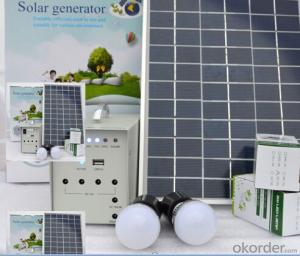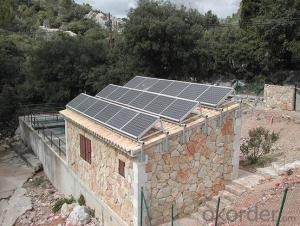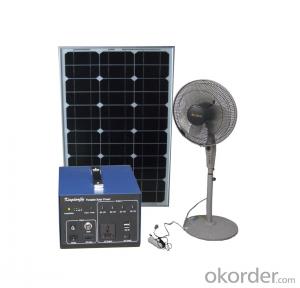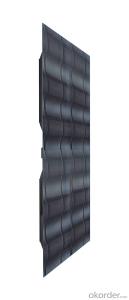CNBM Solar Home System Roof System Capacity-5W
- Loading Port:
- Shanghai
- Payment Terms:
- TT or LC
- Min Order Qty:
- 5 unit
- Supply Capability:
- 500000 unit/month
OKorder Service Pledge
OKorder Financial Service
You Might Also Like
Introduction of Solar Home System
Solar Home System is composed by Solar Panels, Inverters, Charger Controller, Battery, Cable, Mounting Bracket, which is applied to produce electricity for home use.
Solar Home System is quite suitable product in urban area and the place which is short of electricity. Our Small Solar Home System own great benifits compare with other kind electricity resources:
Electricity generating cost of Solar Home System is much cheaper than diesel engine. Beside low electricity making cost, solar system products also have the features of noiseless, clean energy, environmentally friendly and can access to many different electric appliance.
Working Principle of Solar Home System
The stand alone Solar Home System is an off-grid solar system which uses batteries to store the solar energy. Stand alone solar system solutions design for those who are not able or willing to connect to electricity grid.
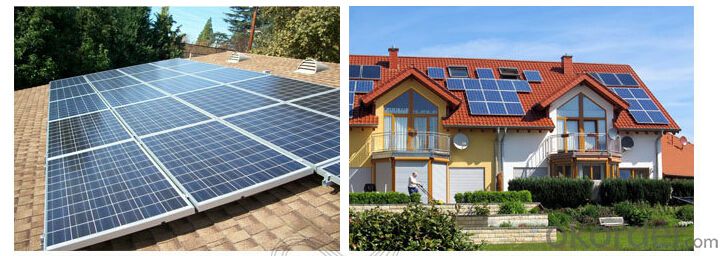


Specification of Solar Home System
Names of Modules | Parameters | Package Specification |
Poly-crystalline Silicon Solar Panel | 18V/5W 245*185*18MM | Package:1 set/box
Encasement:4 sets/ctn
Color Box Size:230*163*310MM Carton Size:475*335*330MM
NW3.04kg/
GW:3.55 kg/set |
Lead Acid Battery | 12V/4AH | |
Controler | 12V/3A | |
Control Box Size | 115*95*148MM | |
LED Light | 3W/6V/12V 2pcs | |
Light Wire | M/24# | |
Solar Panel Line | M/24# | |
Output | 5V/12V |
Advantage of Our Solar Home System
1 Excellent Performance: Our Solar Home System is composed by Brand Standard Kits with high quality. Our solar system has the advantage of high efficiency and stable operation. We can ensure our product with a long life period.
2. Small Orders Accepted: We can accept small orders as our customer’s trial order.
3. Warehouse: We have warehouse overseas which can bring great convenience to our customer to pick up the products.
Terms and Conditions
1. Trade terms: FOB Shanghai
2. Payment terms: 30% T/T, balanced before shipment/ LC at sight before shipment. Actual Terms can be negotiated for big order.
3. Package: Exported standard package suitable for tough handling and sea transport.
4. Delivery: Goods to be ready within 10~30 days depending on order quantity.
5. Warranty: 10 years for solar panel, 2 years for controller/inverter/battery.
FAQ
Q: Could you introduce the background of your company?
A: We are a Group corp. with 1GW capacity in China, which is Okorder’s registered VIP Supplier, possess Financial Service from Okorder.com.
Q: Required mainly certificates (CE&IEC/TUV/RoHS)?
A: Our products are certificated by CE RoHS, IEC, ISO, TUV, UL etc.
Q: Your main exported market is?
A: Main markets of our products is: South-east Asia, Mid-east, Arica, East Europe and Latin America.
- Q:Can a solar energy system be installed on a vehicle?
- Yes, a solar energy system can be installed on a vehicle. This is known as a solar-powered vehicle or solar car. These systems usually consist of solar panels that generate electricity from the sun, which is then used to power the vehicle's electric motor or charge its batteries. While solar cars are still relatively experimental and not widely available, they have shown potential for reducing carbon emissions and increasing energy efficiency in transportation.
- Q:Can a solar energy system be installed in areas with high winds?
- Indeed, areas with high winds are suitable for the installation of solar energy systems. Nevertheless, it is essential to give due consideration to the wind load and tailor the system design accordingly. While solar panels are engineered to endure diverse weather circumstances, including powerful winds, it is imperative that they are mounted and fastened properly to ensure stability. Moreover, the utilization of aerodynamic mounting systems and tilt mechanisms can contribute to diminishing the influence of high winds on the solar panels. To ensure the system's resilience and efficiency, it is advisable to seek guidance from a professional installer who can evaluate the specific wind conditions in the vicinity and propose suitable solutions.
- Q:Can a solar energy system be installed in areas prone to hailstorms?
- Yes, solar energy systems can be installed in areas prone to hailstorms. However, it is essential to consider certain factors to ensure their durability and resilience against hail damage. This includes using high-quality materials, such as tempered glass for solar panels, and proper installation techniques. Additionally, some solar panels are specifically designed to withstand hail and extreme weather conditions, providing further protection.
- Q:Can solar energy systems be used in powering theme parks or water parks?
- Yes, solar energy systems can definitely be used to power theme parks or water parks. Solar energy is a clean and renewable source of power that can provide a sustainable and cost-effective solution for meeting the energy needs of these establishments. Theme parks and water parks require a significant amount of electricity to operate attractions, lighting, water pumps, and other facilities. Installing solar panels can help reduce their reliance on conventional energy sources and decrease their carbon footprint. The large open spaces available in theme parks and water parks are ideal for installing solar panels, which can be mounted on rooftops, carports, or ground-mounted arrays. Solar energy systems can generate electricity by converting sunlight into usable energy through photovoltaic (PV) panels. These panels can be integrated into the infrastructure of the park discreetly and efficiently. The energy generated during the day can be used immediately to power rides, lighting, and other equipment, and any excess energy can be stored in batteries for use during periods of low sunlight or at night. Furthermore, solar energy systems can provide a reliable source of power and reduce the vulnerability of theme parks and water parks to power outages or disruptions in the grid. This is particularly important in areas prone to extreme weather events. By incorporating backup battery storage systems, solar energy can provide a constant and uninterrupted power supply even during emergencies. In addition to the environmental and reliability benefits, solar energy systems can also provide long-term cost savings for theme parks and water parks. While the initial installation cost might be higher, the operational costs are significantly reduced as the sun provides free and abundant energy. Over time, the savings on electricity bills can offset the initial investment, resulting in substantial cost savings for the park's owners. Overall, solar energy systems have the potential to revolutionize the power supply of theme parks and water parks. By harnessing the sun's energy, these establishments can not only reduce their environmental impact but also achieve long-term cost savings and enhanced energy reliability.
- Q:Can solar energy systems be used in areas with limited access to solar fuses and breakers?
- Yes, solar energy systems can still be used in areas with limited access to solar fuses and breakers. While fuses and breakers are important components for safety and protection in solar systems, alternative solutions can be implemented in areas with limited access. These solutions may include using surge protectors, inverters with built-in protection features, or installing additional circuit breakers and fuses at key points in the system. It is crucial to ensure proper installation and regular maintenance to minimize risks and ensure the safe and efficient operation of solar energy systems in such areas.
- Q:What are the environmental impacts of solar energy systems?
- Solar energy systems have minimal environmental impacts compared to other forms of energy generation. Some potential impacts include the production and disposal of solar panels, the use of land for solar installations, and the need for rare earth minerals in panel production. However, these impacts are relatively small and can be mitigated through proper recycling and responsible land use. Additionally, solar energy systems produce no greenhouse gas emissions during operation, helping to reduce air pollution and combat climate change. Overall, the environmental benefits of solar energy far outweigh its potential impacts.
- Q:What is the role of solar trackers in maximizing energy production?
- Solar trackers play a crucial role in maximizing energy production by continuously adjusting the position of solar panels to follow the sun's path throughout the day. This allows the panels to capture the maximum amount of sunlight, increasing the efficiency and output of the solar system.
- Q:How do solar energy systems affect the structural integrity of a building?
- Solar energy systems have minimal impact on the structural integrity of a building. These systems are usually lightweight and designed to be mounted on rooftops or integrated into existing structures. Proper installation and reinforcement measures ensure that the additional weight and stress are adequately supported, preventing any negative effects on the building's structure.
- Q:What is the expected maintenance cost of a solar energy system?
- The maintenance cost of a solar energy system can differ depending on various factors. However, when compared to other methods of generating energy, the maintenance cost of a solar energy system is generally low. Solar panels, which are the crucial component of a solar energy system, are usually designed to be durable and require minimal maintenance. They are constructed to withstand different weather conditions and can last for many years with proper care. However, occasional maintenance may be necessary to ensure optimal performance. The maintenance requirements for a solar energy system typically involve cleaning the panels to remove any dirt, dust, or debris that may accumulate over time. This can be done by using water and a soft brush or with the assistance of automated cleaning systems. It is recommended to clean the panels at least once or twice a year, although this can vary depending on the location and environmental factors. Alongside cleaning, regular inspections of the solar energy system are also vital. This involves checking for any signs of damage, loose connections, or potential issues with the electrical wiring. Inspections can be carried out by the system owner or a professional solar installer, and they are generally done annually. On the whole, the expected maintenance cost of a solar energy system can be relatively low, typically ranging from 0.5% to 1% of the total installation cost per year. This cost mainly covers expenses for cleaning, inspections, and any minor repairs that may be necessary. However, it is important to note that the actual maintenance cost can vary depending on the system's size, location, and specific maintenance requirements. In conclusion, while there are some maintenance tasks associated with a solar energy system, the expected cost is generally low compared to other energy systems. With proper care and regular inspections, a solar energy system can continue to produce clean and renewable energy for many years with minimal maintenance expenses.
- Q:Can solar energy systems be used in powering construction sites or temporary structures?
- Yes, solar energy systems can definitely be used to power construction sites or temporary structures. In fact, solar power is increasingly being utilized in these scenarios due to its numerous advantages. Firstly, construction sites often lack access to traditional power sources, which makes solar energy a practical solution. Solar panels can be easily installed on rooftops, scaffolding, or even on the ground, providing a reliable source of electricity throughout the construction process. Secondly, solar energy systems offer flexibility in terms of power generation. They can be customized to meet specific energy demands of construction sites, whether it is for running power tools, lighting, or charging equipment. This adaptability ensures that construction activities can proceed smoothly without interruptions. Additionally, solar energy systems are environmentally friendly. By harnessing energy from the sun, construction sites can significantly reduce their carbon footprint and contribute to sustainable practices. Solar power does not produce harmful emissions or noise pollution, which is particularly beneficial in urban areas or sensitive environments. Furthermore, solar energy systems offer cost savings in the long run. While the initial investment for installing solar panels might be higher compared to traditional generators, the ongoing operational costs are significantly lower. Construction sites can benefit from reduced fuel expenses, maintenance costs, and reliance on fossil fuels. It is worth mentioning that solar energy systems can also be used for temporary structures such as mobile offices, portable restrooms, or event venues. These structures can be easily powered using solar panels, eliminating the need for generators or grid connections. In conclusion, solar energy systems are a viable and sustainable option for powering construction sites and temporary structures. They provide reliable, customizable, and cost-effective power solutions while minimizing environmental impact. As the global shift towards renewable energy continues, solar power will likely become even more prevalent in construction industry practices.
1. Manufacturer Overview |
|
|---|---|
| Location | |
| Year Established | |
| Annual Output Value | |
| Main Markets | |
| Company Certifications | |
2. Manufacturer Certificates |
|
|---|---|
| a) Certification Name | |
| Range | |
| Reference | |
| Validity Period | |
3. Manufacturer Capability |
|
|---|---|
| a)Trade Capacity | |
| Nearest Port | |
| Export Percentage | |
| No.of Employees in Trade Department | |
| Language Spoken: | |
| b)Factory Information | |
| Factory Size: | |
| No. of Production Lines | |
| Contract Manufacturing | |
| Product Price Range | |
Send your message to us
CNBM Solar Home System Roof System Capacity-5W
- Loading Port:
- Shanghai
- Payment Terms:
- TT or LC
- Min Order Qty:
- 5 unit
- Supply Capability:
- 500000 unit/month
OKorder Service Pledge
OKorder Financial Service
Similar products
New products
Hot products
Hot Searches
Related keywords
